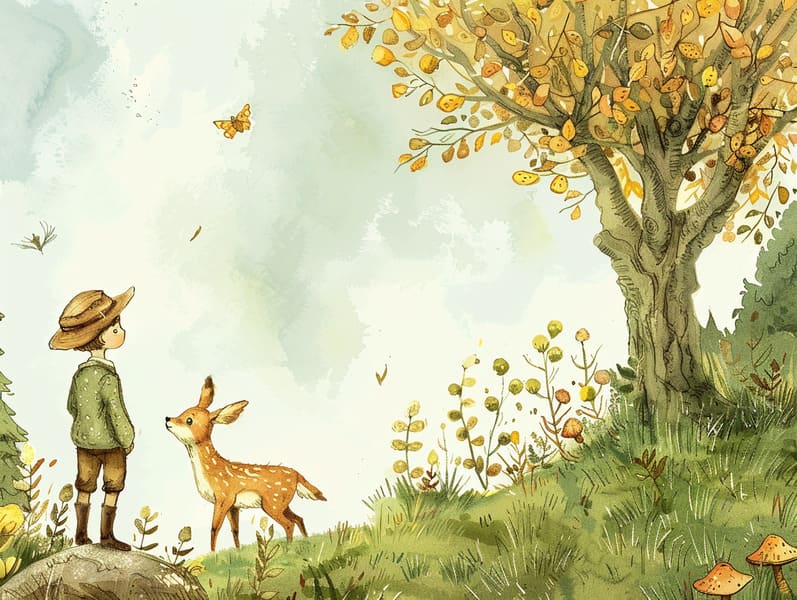Understanding the Magic of Nighttime Narratives: Developing Treasured Experiences with Your Little Ones
Understanding the Magic of Nighttime Narratives: Developing Treasured Experiences with Your Little Ones
Blog Article

The end of the day is a special time for caregivers and children. It’s a opportunity to ease into rest, snuggle, and experience the magic of nightly stories.
For centuries, sleep stories for kids have been a treasured habit, offering more than just a way to go to sleep. They provide an moment for bonding, discovery, and fueling creativity.
Bedtime Stories: Why They Matter
Children's bedtime stories go beyond a way to wrap up the day. They play a important role in a child’s progress and in enhancing the parent-child connection. Here’s why they are important:
1. Quality Time: Reading together at bedtime builds a special period of closeness between adults and their kids. It’s a moment of togetherness that helps children feel secure and content.
2. Language Skills: Listening to stories helps children develop their communication skills. They pick up new terms, understand syntax, and improve their understanding and analytical skills abilities.
3. Fantasy and Imagination: Kids' stories lead them to enchanted worlds, encouraging fantasy. They visualize characters, settings, and adventures, which stimulates their inventiveness.
4. Emotional Skills: Children’s stories often include characters facing trials and emotions. These stories help kids comprehend and deal with their own emotions, encouraging emotional intelligence.
5. Mental Development: Being read a tale helps children develop attention span, recollection, and logical thinking. They improve to follow tales, remember details, and predict outcomes.
Incorporating Stories into Bedtime
Starting a bedtime custom that has reading stories out loud is simple and worthwhile. Here’s how to develop a treasured part of your end-of-day habit:
1. Select a Comfortable Location: Select a comfortable place where you and your child can nestle in without interruptions. A peaceful bed or a cozy reading nook works well.
2. Choose a Specific Time: Pick a consistent time each night for tales. Consistency helps children be ready and makes the custom easier to maintain.
3. Pick Stories for Their Age: Find tales that fit your child’s developmental stage. Toddlers might be drawn to illustrated books with easy plots, while more mature kids may enjoy chapter books with more complex plots.
4. Interact with the Story: Bring the tale be immersive by employing different voices and accents, adding sound effects, and inviting your child to take part. Ask things about the story to keep them focused.
5. Create a Soothing Environment: Reduce the lights, use quiet tones, and create a quiet environment to help your child ease into rest.
Top Places for Bedtime Stories
There are abundant places where you can find great bedtime stories for children. Here are some suggestions to look at:
1. Kids’ Books: Go to your nearby library or read more bookstore to find a large selection of bedtime stories for kids. Checking out the shelves together can be a great activity that also helps children to pick stories that they enjoy.
2. Internet Resources: There are many sites that offer free bedtime stories. Sites like online story sites provide a variety of short stories for kids that you can read online. These websites are great for finding new and assorted stories without cost.
3. Audio Stories and Apps: For nights when you’re too worn out to read, explore audiobooks or storytelling apps. These can provide a gentle reading to read your child a story, ensuring they still get their bedtime story fix. Apps often offer interactive features that can involve them further.
4. Tailored Stories: Create your own stories tailored to your child’s interests. Personalized stories can be especially engaging and meaningful. You can get your child in the narration process, making them a part of the adventure.
Advantages of Short Stories
Quick stories for bedtime are particularly great for bedtime. They provide all the plusses of longer stories but are more compact, making them perfect for relaxing before sleep. Here’s why short stories are a ideal choice:
1. Simple to Understand: Concise narratives are clear and understandable for kids, even after a long day. They can promptly grasp the narrative and enjoy the story without losing focus.
2. Immediate Interest: Short tales promptly engage children, seizing their interest and interest. This makes them great for keeping bedtime customs smooth yet enjoyable.
3. Variety and Flexibility: To-the-point tales allow for variety in your bedtime narrative. You can opt for a different story each night, keeping the custom varied and exciting for your child.
4. Time Efficiency: For busy parents, short stories are a quick way to make sure children still get their nightly dose of storytelling. They fit well into a tight schedule while still offering the full advantages of a bedtime story.
The Charm of "Read Me a Story"
The simple phrase, “Read me a book,” can unlock a world of magic for children. Complying to this request not only meets a child’s desire for attention and engagement but also builds lasting times. Here’s why it’s charming:
1. Link: Reading to your child encourages a deep emotional bond. It’s a time for proximity, sharing, and bonding.
2. Tradition: Establishing a bedtime story practice creates a beloved tradition that children are excited for every night. It’s a tradition that can be passed down through generations.
3. Growing Together: As you read, you’ll experience your child’s development and progress. Their reactions, reactions, and understanding of the stories change, offering insights into their developing minds.
4. Secure Place: Bedtime stories provide a safe space for children to deal with emotions, face fears, and find comfort in the known presence of a parent.
In Summary
Kids’ bedtime stories are a valuable tool for developing a child’s maturation and developing unforgettable experiences of connection.